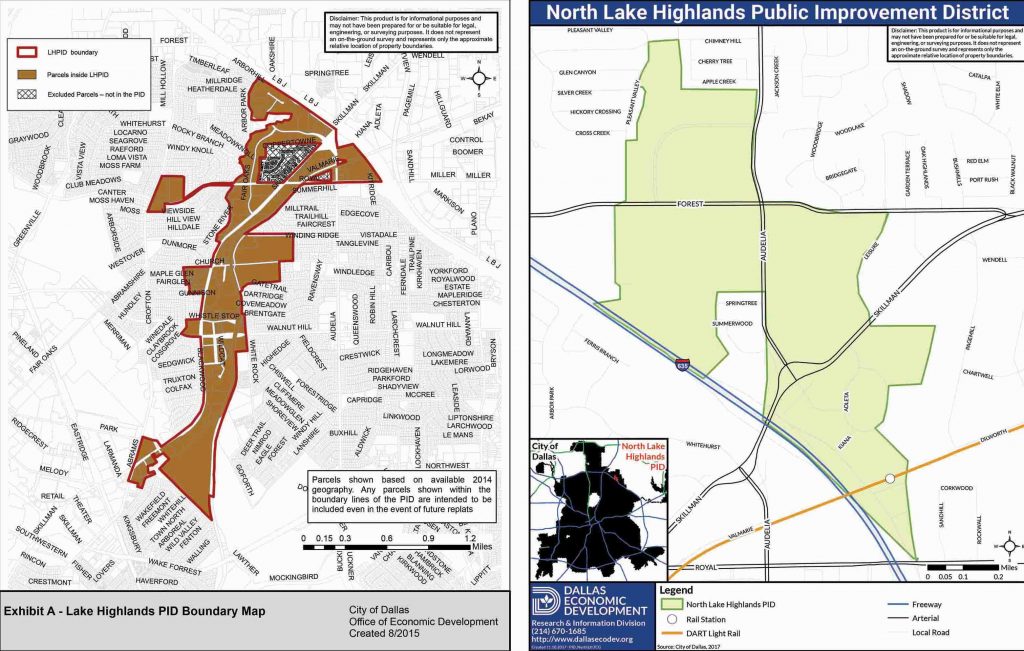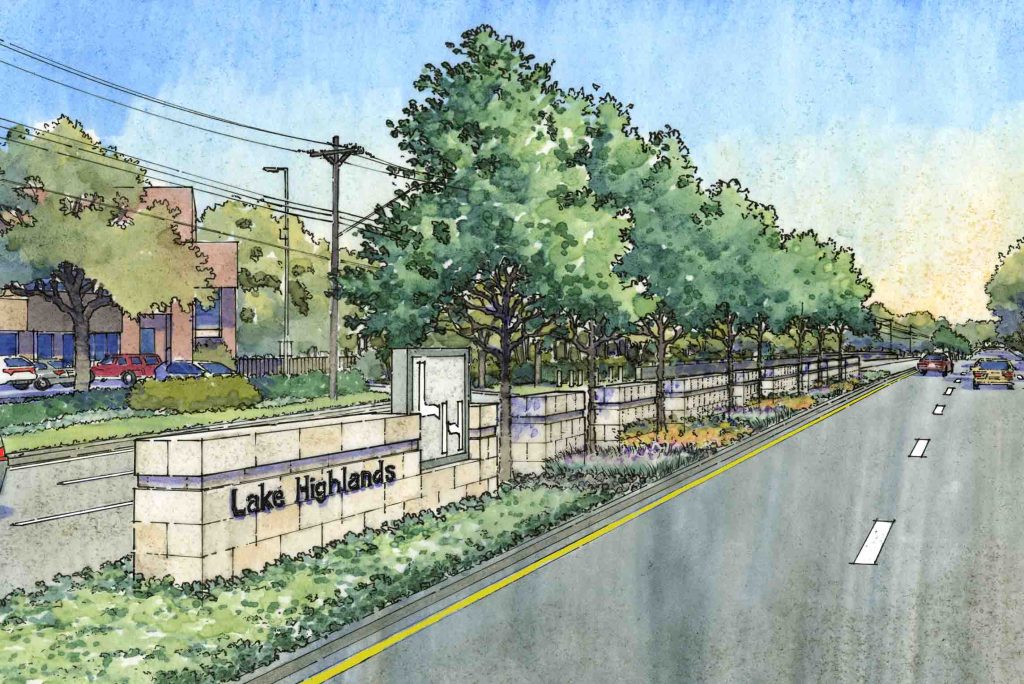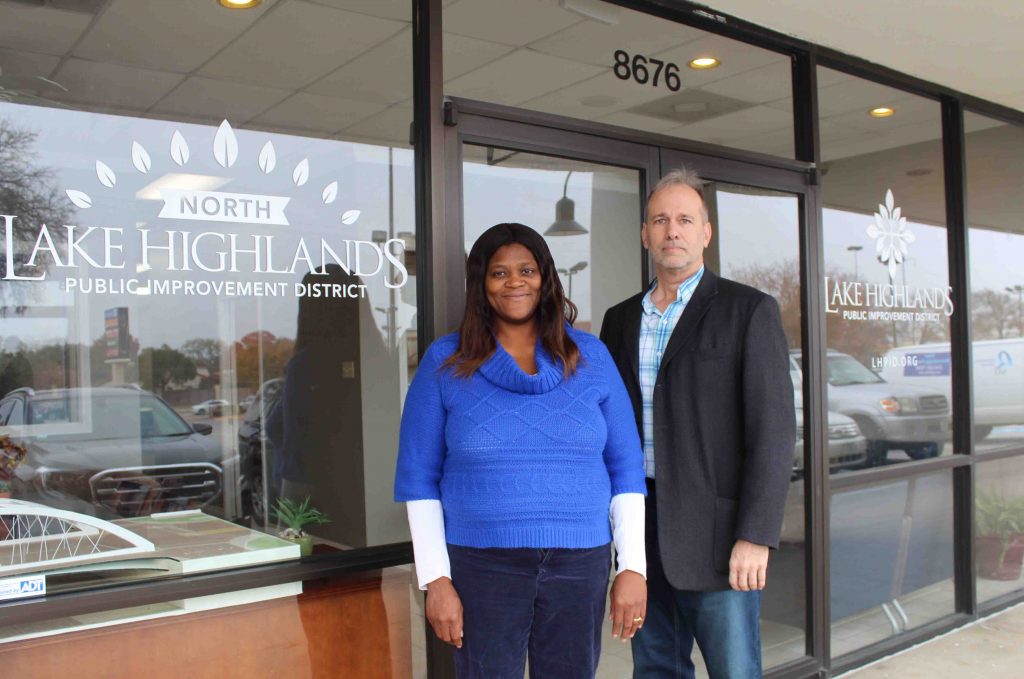When Kathy Stewart left her post as executive director of the Lake Highlands Public Improvement District (LHPID) in November to lead the PID in Uptown, neighbors were nervous. The longtime community advocate is smart – she’s an attorney who owned and operated Highlands Cafe before taking the post – and she’s worked in Lake Highlands apartment communities to help property managers recruit stronger tenants and evict bad actors.
Neighbors needn’t have worried.
Vicki Taylor, Stewart’s assistant at the PID (and at the cafe before that), has taken over executive director duties at the LHPID with gusto. She’s been PTA president at Northlake Elementary and Lake Highlands Junior High, football advisor for Lake Highlands High School, and served in many other roles. Lake Highlands Advocate named her a Fierce Female in 2015.
Chuck Laughlin, a former IT director at Medical City, neighborhood HOA president and board member for the PID, is directing the LH North PID, which began operating in 2018 north of LBJ. Taylor and Laughlin work together with PID bookkeeper Tina Cox in the PID office at Skillman and Royal.
Stewart explained the inner workings of the PID when she took the job in 2014, but the quickie version is that property owners in designated districts pay a special assessment used for public safety, beautification and community-building events within their area. Dallas has 13 PIDs, including Downtown, Knox Street, Fair Park, Klyde Warren Park/Dallas Arts District, Deep Ellum, Oak Lawn and Vickery Meadow.
You may view the LH PID maps above and the full Dallas PID boundaries here.
The LHPID runs (basically) along Skillman from Alamo Drafthouse to LBJ, while the North PID is less linear, centering (mostly) around Forest-Audelia. Property owners representing 60% of property value in an area must first vote to create a PID – essentially volunteering to pay an additional tax. I asked why thrifty property owners might vote yes.
Laughlin: It’s the value of bringing a reduction in crime, the beautification of the area and the sense of community. Reducing crime is a big draw for apartment owners and managers, and we do that by hiring off-duty officers to patrol.
Taylor: We also have quarterly meetings with property managers, security companies and ENPs [extended neighborhood patrols] hired by the PID.
Advocate: You guys click off the names of the apartment communities easily. Is it difficult keeping track since they frequently change names?
Laughlin (laughing): They do change a lot.
Taylor: It’s not hard. The police officers use the addresses, so sometimes we use those instead. The names change when the owners change.
Laughlin: New owners want to refresh. They want to start over with new management.
Advocate: In days gone by we had lots of out-of-state owners. Still true?
Taylor: Oh, yes. We have owners from California, New York, New Jersey, Israel. We only have a few local owners, and you can tell a big difference in their properties.
Advocate: How do you encourage owners to be good citizens?
Taylor: We put boots on the ground. We work with property managers to show them the value of PID membership. We’re like an HOA.
Laughlin: Property managers are the eyes and ears for the owners, so we work on building those relationships.
Taylor: We teach property managers how to select good tenants and legally evict problem tenants, and those lessons benefit sister properties. We encourage them to talk to each other so your problem doesn’t become my problem. They share rental verification information about things like lease violations, drug use and non-payment. They have the ability to call next door and make better choices about who’s coming in.
Laughlin: We’re very fortunate, too, to work with the Dallas Police Department (DPD) at the Northeast Division to host a multifamily workshop where we bring in all the property managers and have them share information. They bring in speakers to talk on eviction, car towing and other mechanisms to better do business on their property.
Taylor: We send out monthly crime reports to our property managers for two reasons – one, to hold them accountable and two, to find out what we can do to help. We work with DPD and Project Safe Neighborhoods (PSN), and we listen to help them better themselves.
Advocate: What impact does the PID make?
Taylor: I’ve seen all these projects the PID has had the opportunity to be a part of – from gateway signage at Skillman/Abrams to the Trestle Project to Trunk or Treat with the Exchange Club to the Teen Job Fair at Lake Highlands High School to the Consumer Protection Fair at the LH Recreation Center to Sundays in the Park to Camp Sweeney’s Play for the Day. It’s kind of like we’re the hub. We have assessment dollars we can use to build the community. We can get the communication out. We have the means, and we’ve been in the community for a long time.
Laughlin: The north is a little behind the south since we’re just coming in, but we’re seeing benefits from the National Night Out we did, bringing together people from the homes and the apartments so it’s no longer us vs. them. The boxing gym at Forest-Audelia gives the kids a place to go after school and provides mentorship. Praise Embassy Church above the gym started a food distribution in cooperation with the North Texas Food Bank and Catholic Charities.
Taylor: When we do events, they’re not just for fun. We provide resources. Vendors come out like Feed Lake Highlands, Pamper Lake Highlands, Forerunner Mentoring, Healing Hands and City on the Go. People from the North Texas Food Bank teach residents how to get Medicaid and food stamps, and people from the community courts teach how to work off a ticket or get a warrant lifted. We don’t have an event just to have it.
Laughlin: We worked with Dallas County Health and Human Services to do STD testing because they said [the zip code] 75243 had the highest incidence of infection in the county. We hosted a big event with food and gave out gift cards to everyone who was tested.
Advocate: The PID is currently building gateway signage in partnership with the City of Dallas at the Skillman bridge close to Alamo Drafthouse. Why does that seem to be taking so long?
Taylor: Construction crews are also working to build the trails nearby, and some of those sections are in the flood plain. They work on the trails when they can get down there and on signage when they can’t. But the signage will be completed in December. Our first beautification project was the median on Skillman at Church. We added trees and landscaping, but it’s time-consuming to maintain. Then a car crashes into it, and we have to work on it again. We’re also doing design work on the Trestle Project with the Lake Highlands Junior Women’s League.
Our next goal is to create safety crosswalks at intersections within the PID. [Deputy Mayor Pro Tem] Adam McGough has a bigger goal for crosswalks throughout D10, but ours in the PID are likely to be built first since we have the dollars.
Taylor and Laughlin’s answers have been edited for brevity and clarity.








